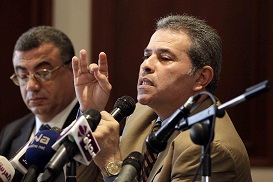CAIRO: Despite not fully complying with the Trafficking Victims Protection Act’s minimum standards, Egypt is making a significant effort towards compliance, according to a US State Department report.
The 2011 global “Trafficking in Persons (TIP) Report” released June 27 by the US State Department said Egypt is a source, transit and destination country for women and children subjected to forced labor and sex trafficking.
US Secretary of State Hillary Clinton said in her remarks on the report that “the decade of delivery is upon us”— calling on all nations to act against the atrocities of human trafficking.
According to the TIP Report, an estimated 200,000 to 1 million Egyptian children are victims of sex trafficking and forced begging. Many are forced into domestic and agricultural labor where they experience restriction on movement, non-payment of wages and physical or sexual abuse.
A persistent issue is child sex tourism. Wealthy men, mainly from Saudi Arabia, the United Arab Emirates and Kuwait, arrange for “temporary” or “summer marriages” with Egyptian females, including girls under the age of 18. The arrangements are often facilitated by a marriage broker or the bride’s parents who profit from the transaction. Children involved in these temporary marriages suffer both sexual servitude and forced labor as servants to their “husbands.”
Men, as well as women, from South and Southeast Asia and Africa are subject to forced labor in Egypt. UN sources report that Egypt may have a large number of foreign workers in domestic service who have been held in coercive conditions of forced labor. The report states that these workers face severe restrictions of liberty and undergo physical, emotional and sexual abuse.
Estonia and Belarus were put on the human trafficking watchlist, alleging they failed in the last year to step up efforts to fight prostitution and forced labor, with Russia on the list for the eighth consecutive year for the same alleged failures, AFP reported.
The report said women and children are sold into the sex trade in Russia, Germany, Poland, the Czech Republic, Lithuania, Spain, Greece, Belgium, Turkey, Israel, Lebanon and the United Arab Emirates.
While the government of Egypt has not been in full compliance with the minimum standards for the elimination of trafficking, there is an effort being made to meet requirements.
Egypt collaborated with the International Organization for Migration (IOM) to open a shelter for victims of trafficking in Cairo, and developed and published a comprehensive action plan to address all aspects of trafficking.
All forms of human trafficking are prohibited through the 2010 anti-trafficking law, which prescribes penalties from three to 15 years of imprisonment — and even a sentence of life imprisonment if aggravating circumstances are evident — along with fines ranging from $9,000 to $36,000. These are penalties are considered adequately stringent and correspond with penalties prescribed for other serious offenses, such as rape.
Officials reported investigating 50 cases of temporary marriages and convicting 29 imams, marriage brokers, and parents who profited from facilitating these marriages, as well as the men who attempted to purchase the young girls in marriage.
The government also established a microcredit loan system to provide alternative income to parents who might otherwise sell their children into exploitative marriages
Egypt has made significant effort to protect victims of human trafficking and has made progress in preventing certain forms of human trafficking, the report said. However, despite the positive efforts to fight the trafficking of persons, the government failed to establish a formal procedure to identify victims of trafficking or to complete a referral mechanism to facilitate treatment for victims.
Trafficking victims arrested for prostitution were often treated as criminals rather than victims — which may have led to the further mistreatment of victims through verbal, physical and sexual abuse.
The government did not report any considerable efforts to address forced labor of children in domestic servitude and other sectors, and similarly failed to report efforts to address the problem of domestic servitude and other forms of forced labor of migrant workers.
The US State Department suggests Egypt implement regulations to increase law enforcement activity against all forms of trafficking. Authorities ought to ensure that identified trafficking victims are not penalized for unlawful acts committed as a direct result of their exploitation.
The report also recommends greater efforts be made to investigate and punish government officials complicit in trafficking offenses. The government should continue to raise awareness on the definition and dangers of trafficking.

